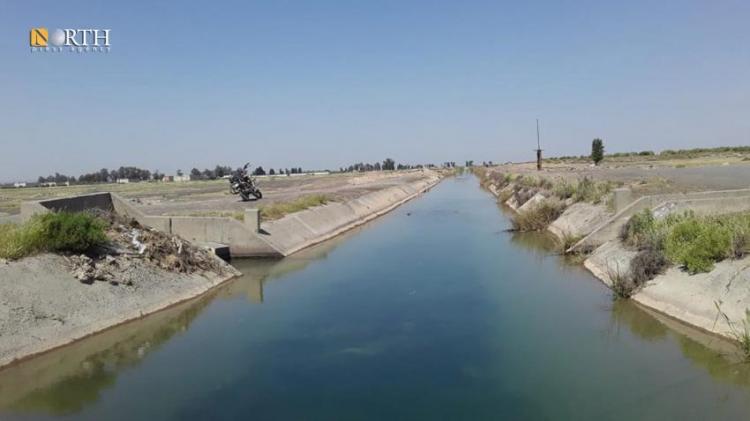Victor Mustafa
KOBANE, Syria (North Press) – Discriminatory policies against the Kurds by the Syrian regime since the 1960s, aimed at keeping the country’s predominantly Kurdish north poor in projects and investment, has led the region to suffer from a lack of water resources while the country’s main rivers continue to fulfill the rest of Syria’s needs.
After the outbreak of the Syrian Civil War in 2011, Syrian government forces withdrew from many parts of Syria’s north, known as Rojava. Here, Kurds and other Syrian communities formed an autonomous administration. They also established a military force, the People’s Protection Units (YPG), the leading component of the Syrian Democratic Forces (SDF), a key U.S. ally in fighting against the Islamic State (ISIS).
Over the past nine years, Kurdish-led authorities have been engaged in fighting against ISIS and al-Qaeda affiliated groups, and thus were unable to implement large water and electricity projects, despite controlling most of Syria’s main resources such as water, oil, and wheat.
The northern Syrian Kurdish town of Kobane, famous for its siege by ISIS and subsequent liberation by the YPG, suffers from lack of water, despite being less than 30km from the Euphrates River. Meanwhile, distant provinces like Aleppo has water projects taken from Euphrates River despite being nearly 100km from the river.
For more than fifty years, the Syrian regime’s Ba’ath party (a pan-Arab nationalist party that is the official party of the regime) employed discriminatory practices against the Kurdish people, leaving them homeless and seeking daily labor in the other cities in the country,” Khalsa Haj Abdulqadir, co-head of the Water Authority in Kobane, told North Press.
“Look at the Euphrates River on the Syrian map and the projects established on it – all these projects serve only the Arab majority areas,” he said.
Abdulqadir further explained that a large water project implemented by Syrian regime about three years ago takes water from the Euphrates River to Aleppo.
“The project includes 150km of canals which bring water to the city of Aleppo, and many other irrigation projects supply Raqqa and Deir ez-Zor regions."
“All these projects were carried out in the Arab majority areas, while Kobane and many other Kurdish majority areas are still poor in irrigation projects,” he said.
Massoud Qadir Muhammad, a local political analyst, told North Press, "Since the Ba’ath Party came to power, the Syrian regime deliberately disintegrated and attempted to Arabize the Kurdish community, marginalized Kurdish areas, and made a lot of attempts to change the demography of the region.”
Muhammad added that the Syrian government then confiscated the Kurds' agricultural lands under the pretext of the Agricultural Reform Law and transferred their ownerships to Arab families from Raqqa.
“The Syrian regime then justified this act by saying that dozens of Arab families lost their homes and lands as they were flooded by a lake created by the construction of Tabqa Dam in the 1970s,” he said.
“At that time, the regime said they would compensate Arab families who lost their lands, but unfortunately they did it by expelling the Kurds from their lands and giving them to the Arabs.”
Muhammad also pointed to another practice against the Kurds in the 1960s – stripping tens of thousands of Kurds of their Syrian citizenships.
In 1955, the Syrian regime commissioned an officer named Muhammad Talib Hilal to the majority Kurdish areas of the country to conduct a study. Hilal made ten recommendations to the Syrian government at the time, one of which was to ban factories and irrigation projects.
Hilal's recommendations to the Syrian government also included banning the opening of universities and any language other than Arabic in the Kurdish-majority areas.
Several farmers in the area told North Press that the agricultural sector in Kobane has been marginalized for decades.
Ibrahim Khalil, a 62-year-old farmer from Kobane, told North Press, “About thirty years ago, I made many complaints and appeals to the agriculture department of the Syrian regime, but no one responded, until their farms were affected by drought due to a lack of water.”
59-year-old farmer Ahmad Muhammad, said he had the same problem and response from the Syrian government at that time.
Muhammad and Khalil said they resorted to digging wells, the only option available to them.
“The water from the well was salty and heavily affected agriculture in general,” Muhammed said.
Khalil also added that the salty water had a bad impact on people’s health, causing issues such as kidney failure, which he said was the main disease in the region because of lack of potable water.
Currently, the Autonomous Administration has begun implementing some projects aiming at bringing stability and safety to the region, especially after liberating the area from ISIS. One of top priorities for the Autonomous Administration, according to officials, is bringing the Euphrates’ water to the Kobane area.

